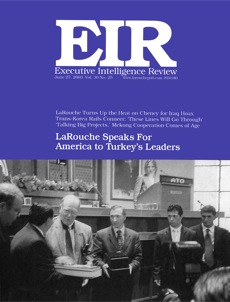LaRouche Speaks for America to Turkey’s Leaders
by Muriel Mirak-Weissbach
Addressing a nation hard-hit by the political ramifications of the Iraq War, Lyndon LaRouche was able, during his June 13-18 visit, to shift the mood in the country from pessimism to hope that U.S.-Turkish relations can be repaired, not through Ankara’s capitulation to imperial dictate, but through a fundamental shift inside the United States, spearheaded by LaRouche’s Presidential campaign. He was the keynote speaker at a conference in Istanbul, co-sponsored by the Cultural Affairs Department of the Istanbul Municipality, on the theme “Eurasia: New Key for Global Development and Peace”; and another, on the same theme, hosted by the Ankara Chamber of Commerce. Among the 700 people attending the two events were government ministers, members of Parliament, intellectuals, professors and students, and the media.
Economics
Trans-Korean Rail: ‘These Lines Will Go Through!’
by Kathy Wolfe
In simultaneous ceremonies on the western Kyongui Line and eastern Donghae Line, the two Koreas at 1:00 p.m. on June 14 re-connected the lines of the Trans-Korean Railway for the first time since Sept. 1, 1945.
Italian ‘EU New Deal’ Plan Gains Momentum
by Claudio Celani
The Italian government’s plan, “Action for Economic Growth,” calls for European Union public investments in infrastructure projects—outside the suicidal strictures of the Maastricht Treaty.
‘We’re Talking About Big Projects’ in Mekong
by Michael Billington
An interview with H.E. Roland Eng.
Mekong Cooperation Project Comes of Age
by Gail G. Billington
The story of Mekong cooperation is that of an attempt to pursue great infrastructure projects in a time of war, in order to find an alternative to war.
Business Briefs
Feature
Asia Can Be the Motor of Economic Recovery for Europe
by Jonathan Tennenbaum
“Could the economic development process, now occurring in China and its neighbors in Southeast and Southern Asia—together accounting for over half the world’s population—offset the effects of the profound economic crisis gripping most of the rest of the world? Could Asia’s growth prevent a full-scale ‘Great Depression’ from taking hold of the global economy, and provide a way out for Germany and other export-oriented nations in Europe? Our answer, developed here, is a resounding ‘Yes!’” From a Special Report of EIR Nachrichtenagentur, The Lautenbach Plan and Eurasian Development: Measures To Overcome Mass Unemployment.
The World Must Go Back to the Proven Practice of National Banking Systems
An interview with Lyndon H. LaRouche, Jr.
International
Tony Blair’s ‘Great Deception’ Unmasked
Things were already plenty hot for Blair when, on June 17, two former members of his Cabinet—International Development Secretary Clare Short, and Foreign Secretary Robin Cook—testified before the House of Commons All-Party Select Foreign Affairs Committee, and exposed how Blair had lied to get Britain into the war against Iraq.
U.S. Pressures India To Send Troops to Iraq
by Ramtanu Maitra
ASEAN Warns U.S. on Myanmar Sanctions
by Michael Billington
Mexico: LaRouche’s Friend Wins Debate in Nuevo León
by Zaid Jaloma
Peru ‘Truth Commission’ Oversees Terror Revival
by Manuel Hidalgo
International Intelligence
Interviews
H.E. Roland Eng
Cambodia’s Ambassador to the United States played a leading role in the first-ever summit of the six members of the Greater Mekong Subregion (GMS), held in Phnom Penh in November 2002. He discusses the great prospects for cooperation to develop the Mekong River basin.
Lyndon H. LaRouche, Jr.
Democratic Party Presidential precandidate LaRouche gave this interview to EIR Nachrichtenagentur in Germany, on April 15.
National
LaRouche Turns Up the Heat on Cheney’s Iraq Intelligence Hoax
by Jeffrey Steinberg
One measure of the impact of the LaRouche campaign exposé of the network of neo-conservatives, Leo Strauss protégés, and fellow travellers of Israel’s Likud party in and around the Bush Administration, is the spate of hysterical media admissions that LaRouche was the source of the “Leo-con” revelations.
Wolfowitz Grilled at Congressional Hearing
by Edward Spannaus
Gen. Shinseki Retires, Hits Rumsfeld’s Leadership Failure
by Edward Spannaus
DOJ Inspector General Blasts Ashcroft on 9/11
by Edward Spannaus
California Careens Toward Ungovernability
by Harley Schlanger
Congressional Closeup
by Carl Osgood
National News
Departments
Editorial
It’s Time for a ‘New Deal.’



